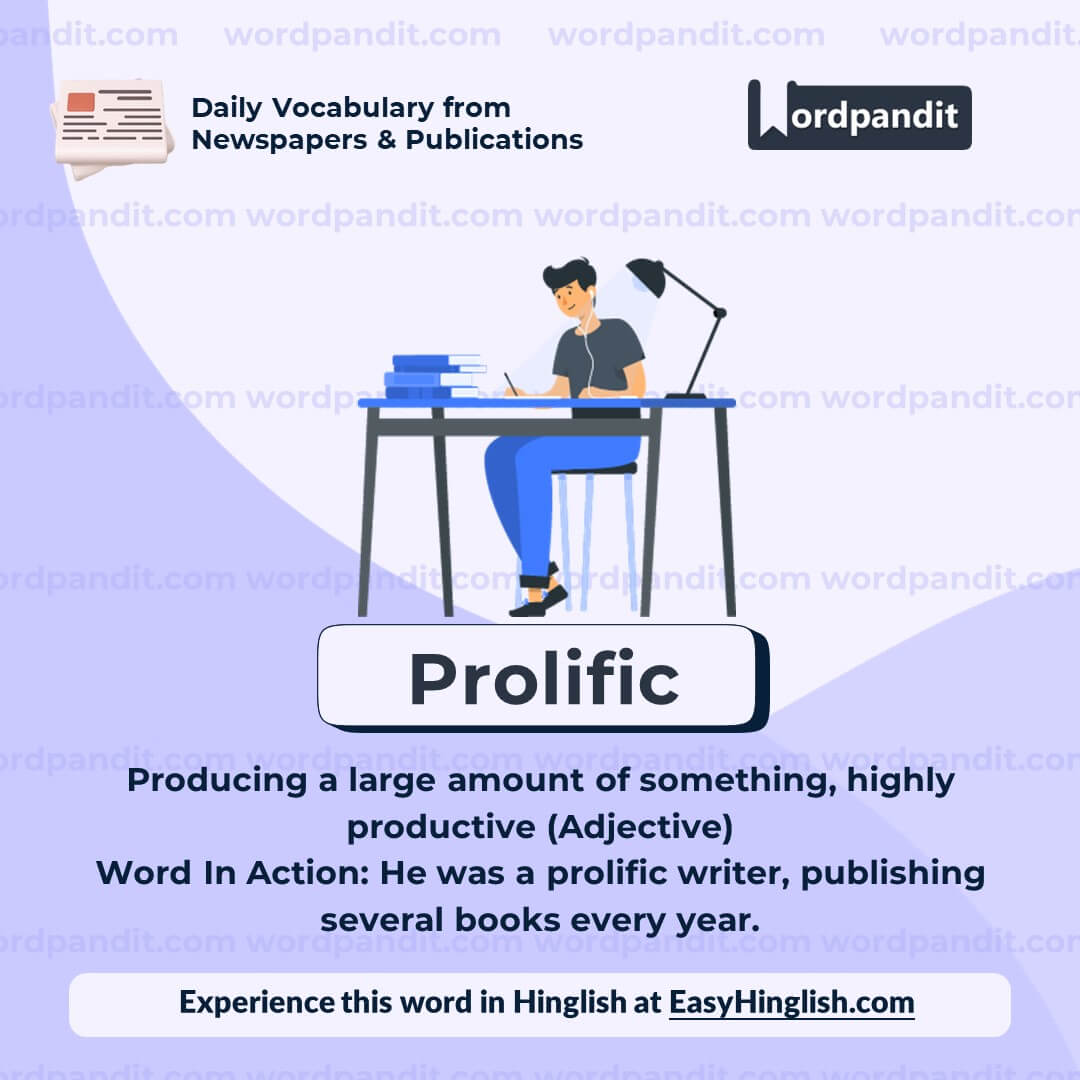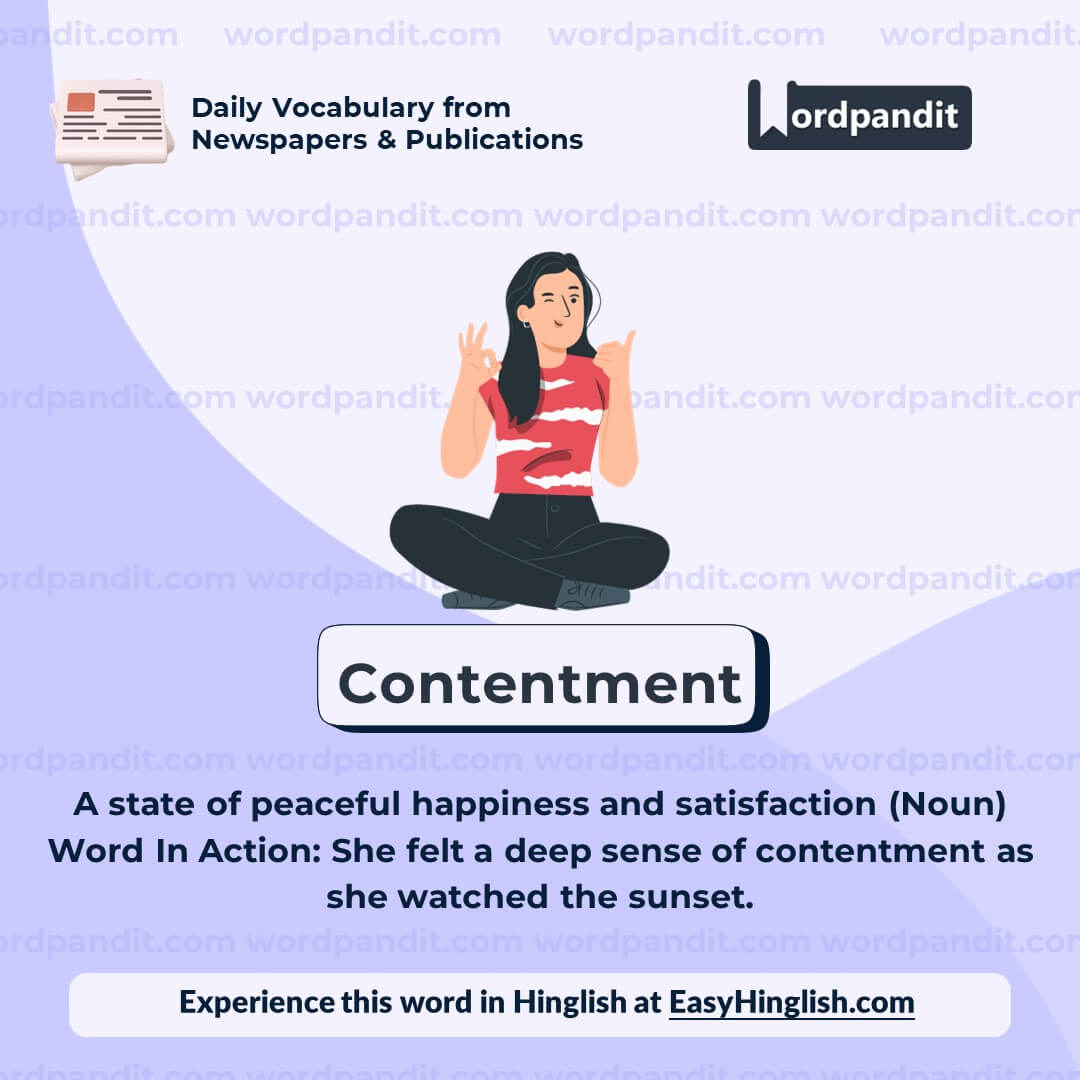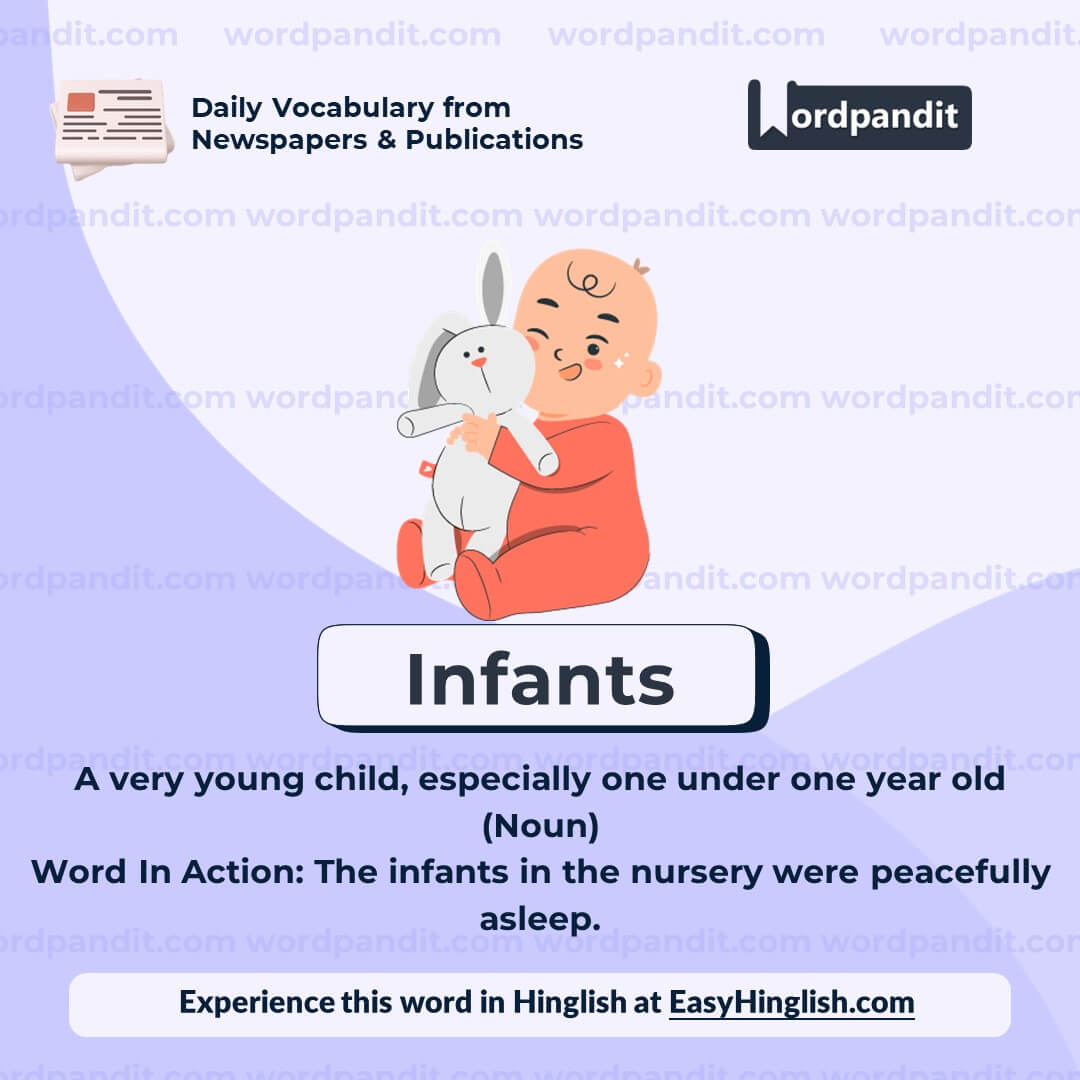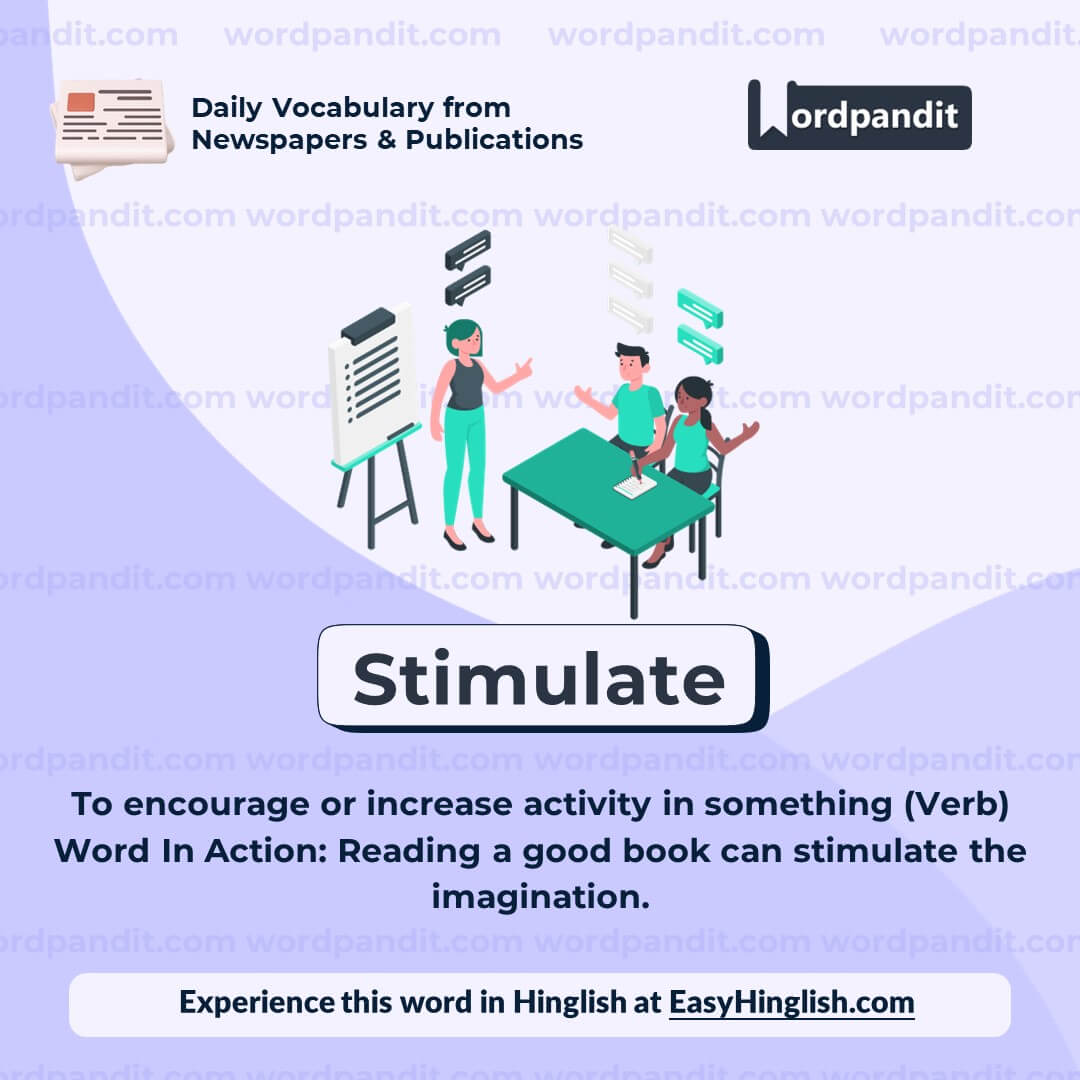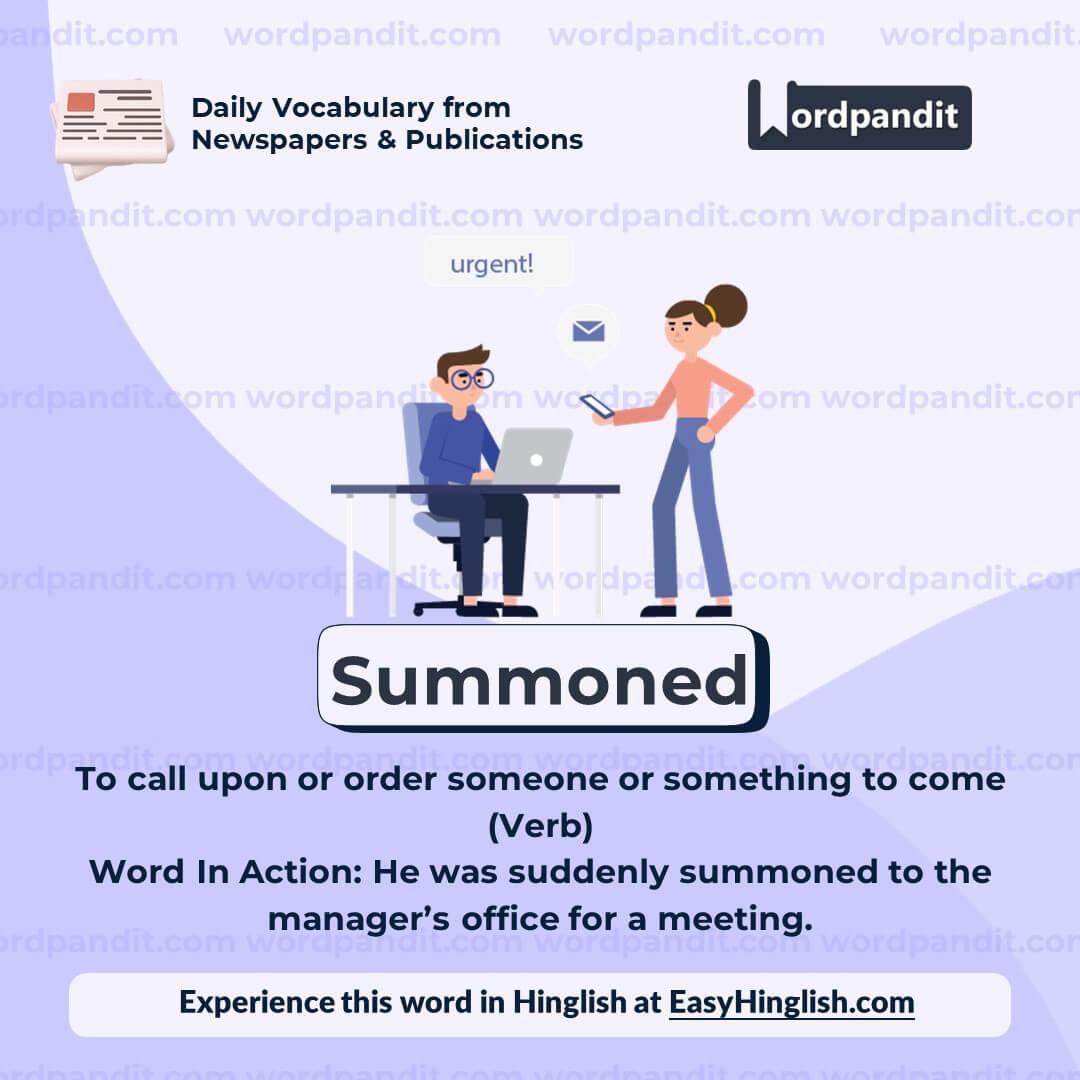Daily Vocabulary from International Newspapers and Publications
Expand Your Vocabulary with Wordpandit’s Global Vocabulary Hub
At Wordpandit, we are committed to helping you develop a truly global vocabulary by drawing from some of the most respected international publications. This section is designed to keep you ahead of the curve by introducing you to words that define global conversations and trends.
The Power of Global Sources
To help you think and communicate on a global scale, we curate vocabulary from renowned international sources, such as:
- The New York Times
- The Washington Post
- BBC
- The Guardian
- The Economist
- Scientific American
- Psychology Today
- And many more...
Stay Global, Stay Competitive
Our daily updates from international publications ensure you are consistently exposed to new words that reflect global news and developments, making sure your vocabulary is not only current but also globally relevant.
Enhance Your Global Perspective
Whether you’re preparing for international exams, aiming to excel in global business communication, or want to enhance your language skills for personal growth, Wordpandit offers the resources you need to thrive in a global context.
Effective Learning, Global Reach
Our learning methodology combines global examples, memory aids, and interactive activities, allowing you to internalize new words effectively and apply them in real-world scenarios.
Begin Your Global Vocabulary Journey Now!
Why Choose Wordpandit?
Practical Learning: Focus on words you'll actually encounter in real-world reading, enhancing your comprehension and communication skills.
Diverse Content: From current affairs to scientific breakthroughs, our varied sources expose you to vocabulary across multiple domains.
Effortless Integration: Make Wordpandit a part of your daily routine. Just a few minutes each day can significantly boost your lexicon over time.
Your Path to Vocabulary Mastery
- Visit our Daily Vocabulary section regularly
- Explore new words and their usage in context
- Practice incorporating these words into your own writing and speech
- Track your progress as your vocabulary expands
Start Your Journey Today
Embark on your vocabulary enhancement journey with Wordpandit. By consistently engaging with our daily posts, you'll build a robust vocabulary that serves you well in academic, professional, and personal contexts.
Remember, a word a day keeps linguistic limitations at bay. Make Wordpandit your daily companion in the quest for vocabulary excellence!
WORD-1: Prolific
Context:
"A prolific writer and editor, Robbins aligned with the hippie sensibilities of the 1960s, writing books under his guiding philosophy of 'serious playfulness' – outlandish characters, absurd metaphors and fantastical prose, like a hit of literary LSD." - The Guardian
Explanatory Paragraph:
The word "prolific" refers to someone or something that produces a large amount of something, often with great quality and frequency. It is commonly used to describe writers, artists, or creators who generate a vast body of work. A prolific person is highly productive and consistently produces significant output in their field.
Meaning: Producing a large amount of something, highly productive (Adjective)
Pronunciation: pro-LIF-ik
Difficulty Level: ⭐⭐⭐ Intermediate
Etymology: Derived from the Latin word "prolificus," meaning "producing offspring abundantly," from "proles" (offspring) and "facere" (to make).
Synonyms & Antonyms:
Synonyms: Productive, creative, fertile, abundant, copious
Antonyms: Unproductive, barren, sparse, sterile
Usage Examples:
- Shakespeare was a prolific playwright, having written over 30 plays and numerous sonnets.
- The apple orchard was particularly prolific this year, yielding more fruit than ever before.
- She is a prolific researcher, publishing multiple papers in prestigious journals annually.
- His prolific career in filmmaking has earned him worldwide recognition.
Cultural Reference:
"Pablo Picasso was one of the most prolific artists of all time, producing over 50,000 artworks in his lifetime." - Art History Archives
Think About It:
What factors contribute to someone becoming prolific in their field? Is it talent, discipline, inspiration, or a mix of all?
Quick Activity:
Write a short paragraph describing a prolific person you admire. Explain what makes them prolific and how their productivity has impacted their field.
Memory Tip:
Think of "Prolific" as "Pro" (expert) + "Lif" (Life) = An expert who is full of life and produces abundantly!
Real-World Application:
Being prolific is highly valued in creative industries, academia, and business. Authors who write many bestsellers, scientists who publish breakthrough research, and entrepreneurs who launch multiple successful startups are all considered prolific in their domains.
WORD-2: Contentment
Context:
"Love easily confuses us because it is always in flux between illusion and substance, between memory and wish, between contentment and need." - The Guardian
Explanatory Paragraph:
"Contentment" refers to a deep sense of satisfaction and peace with what one has. Unlike temporary happiness, which can come and go, contentment is a long-lasting state of accepting and appreciating life as it is. It is the feeling of being at ease and not constantly craving more.
Meaning: A state of peaceful happiness and satisfaction (Noun)
Pronunciation: kuhn-TENT-muhnt
Difficulty Level: ⭐⭐ Beginner
Etymology: Derived from the Latin word "contentus," meaning "contained" or "satisfied," from "continere" (to hold together).
Synonyms & Antonyms:
Synonyms: Satisfaction, peace, fulfillment, serenity, tranquility
Antonyms: Discontent, dissatisfaction, restlessness, longing, unease
Usage Examples:
- She found contentment in simple pleasures, like reading a book by the fireplace.
- True contentment comes from appreciating what you have rather than always wanting more.
- Despite his wealth, he never felt a sense of contentment and always sought more.
- Practicing gratitude daily can lead to a greater sense of contentment.
Cultural Reference:
"The greatest wealth is contentment with little." - A quote attributed to Socrates, emphasizing that true happiness comes from appreciating what we have.
Think About It:
Is contentment something that comes naturally, or is it something we must actively cultivate in our daily lives?
Quick Activity:
Write down three things in your life that bring you contentment. Reflect on how they contribute to your happiness.
Memory Tip:
Remember "contentment" by linking it to "content"—when you are truly "content" with what you have, you experience "contentment"!
Real-World Application:
In today's fast-paced world, many people seek contentment through mindfulness, gratitude, and simplifying their lives. It is often considered a key to long-term happiness and well-being.
WORD-3: Infants
Context:
"This is especially important for infants and young children whose brains are still developing in the first years of life." - Psychology Today
Explanatory Paragraph:
The word "infants" refers to very young children, typically under the age of one. Infants rely entirely on caregivers for their needs, including food, comfort, and protection. This stage of life is critical for brain development, learning, and emotional bonding.
Meaning: A very young child, especially one under one year old (Noun)
Pronunciation: IN-fuhnts
Difficulty Level: ⭐ Beginner
Etymology: Derived from the Latin word "infans," meaning "unable to speak" (from "in-" meaning "not" and "fari" meaning "to speak").
Synonyms & Antonyms:
Synonyms: Baby, newborn, toddler (though slightly older), neonate
Antonyms: Adult, grown-up, adolescent
Usage Examples:
- Infants require constant care and attention from their parents or caregivers.
- Research shows that talking to infants helps develop their language skills early on.
- The hospital has a special ward dedicated to premature infants who need intensive care.
- Infants develop emotional bonds through touch, eye contact, and gentle sounds.
Cultural Reference:
"The first five years of life are crucial for an infant’s brain development, shaping their future cognitive abilities and emotional well-being." - UNICEF
Think About It:
Why do you think human infants take longer to become independent compared to other animals?
Quick Activity:
Make a list of three essential things that parents or caregivers should do to ensure healthy development in infants.
Memory Tip:
Think of "infants" as "in fantasy"—since they are in the earliest stage of life and rely entirely on others, almost like living in a dreamlike state!
Real-World Application:
Understanding infant development is crucial for parents, educators, and healthcare professionals. Proper care, nutrition, and early interactions shape an infant’s future learning and emotional well-being.
WORD-4: Stimulate
Context:
"Scientists believe that brain activity during REM sleep (which is the stage of sleep when the brain is most active) helps stimulate the visual system which doesn’t get a lot of stimulation in the first few months of life." - Psychology Today
Explanatory Paragraph:
The word "stimulate" means to encourage or increase activity in something. It is commonly used in scientific, educational, and psychological contexts to describe actions that enhance growth, alertness, or function. For example, caffeine stimulates the nervous system, and playing with toys stimulates a child’s creativity.
Meaning: To encourage or increase activity in something (Verb)
Pronunciation: STIM-yuh-layt
Difficulty Level: ⭐⭐⭐ Intermediate
Etymology: Derived from the Latin word "stimulare," meaning "to goad" or "urge forward."
Synonyms & Antonyms:
Synonyms: Activate, excite, energize, arouse, inspire
Antonyms: Suppress, weaken, dull, discourage, hinder
Usage Examples:
- Drinking coffee in the morning helps stimulate brain function and alertness.
- Parents use colorful toys to stimulate their babies' senses and curiosity.
- The teacher designed activities to stimulate students’ interest in science.
- Physical exercise stimulates blood circulation and overall health.
Cultural Reference:
"Music has the power to stimulate emotions and bring back vivid memories from the past." - Neuroscience Studies
Think About It:
What are some daily activities you do that stimulate your brain and keep you mentally active?
Quick Activity:
List three things that stimulate creativity and explain how they encourage new ideas.
Memory Tip:
Think of "stimulate" like a "stimulus"—when something stimulates you, it pushes you into action, just like how a spark ignites a fire!
Real-World Application:
Stimulating the brain through reading, problem-solving, and learning new skills helps improve cognitive function and memory. Many people use brain games and puzzles to stay mentally sharp.
WORD-5: Summoned
Context:
"Evoking a children’s book that’s been summoned to motion, her BAFTA-award winning short film Grandad Was a Romantic features a young girl recalling how her grandfather – an exceptional athlete and irrepressible charmer – fell in love with her grandmother’s picture, travelled great distances to seek her hand in marriage and eventually started a family with her." - Psyche
Explanatory Paragraph:
The word "summoned" means to call upon someone or something to come or appear, often with urgency or authority. It can refer to an official request, such as being summoned to court, or a more figurative meaning, like summoning the courage to face a challenge. In literature and storytelling, "summoned" can also describe bringing something to life or into existence.
Meaning: To call upon or order someone or something to come (Verb)
Pronunciation: SUH-muhnd
Difficulty Level: ⭐⭐⭐ Intermediate
Etymology: Derived from the Latin word "summonere," meaning "to give a reminder or call up," from "sub-" (under) and "monere" (to warn or advise).
Synonyms & Antonyms:
Synonyms: Called, beckoned, ordered, commanded, invoked
Antonyms: Dismissed, ignored, banished, neglected
Usage Examples:
- The judge summoned the witness to testify in court.
- She summoned all her courage before stepping onto the stage.
- In the novel, the wizard summoned a powerful spirit to aid him in battle.
- The CEO summoned the employees for an urgent meeting.
Cultural Reference:
"In many mythologies, heroes summon supernatural beings or divine help to overcome challenges. For example, in Homer’s Odyssey, Odysseus summons the spirits of the dead to seek guidance." - Classical Literature Studies
Think About It:
Can you think of a time when you had to summon courage or determination to face a difficult situation? How did it help you?
Quick Activity:
Write a short story where a character summons something unexpected—whether it’s a magical creature, a lost memory, or a hidden strength.
Memory Tip:
Think of "summoned" as similar to "summons"—both involve calling someone or something into action, whether in a courtroom or a supernatural tale!
Real-World Application:
The word "summoned" is frequently used in legal and business settings (e.g., being summoned to a meeting or court). It is also used in storytelling and self-improvement contexts, such as summoning inner strength or motivation.



